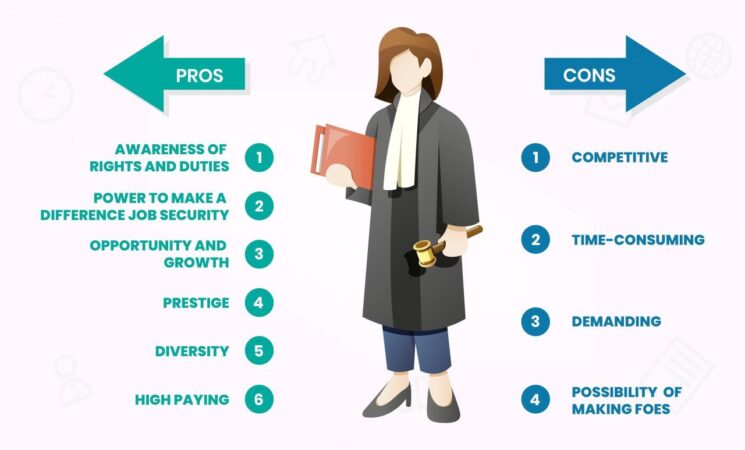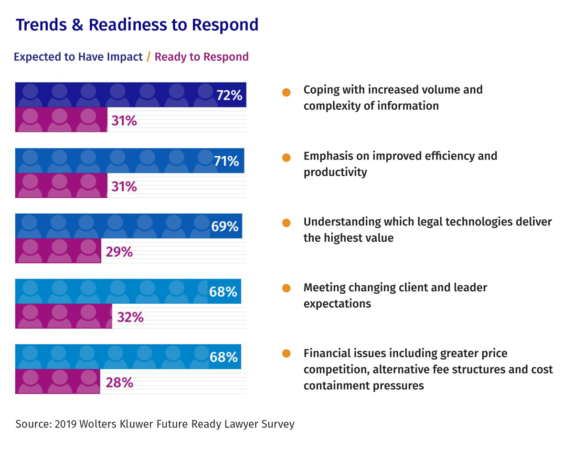
The legal profession offers a wide array of career paths, from traditional legal fields to emerging areas and alternative career options. Whether you’re drawn to the courtroom drama of criminal law, the intricacies of corporate transactions, or the cutting-edge challenges of cybersecurity law, there’s a niche for you within the legal world.
This comprehensive guide explores the diverse landscape of legal careers, examining traditional and emerging fields, alternative paths, essential skills, job market trends, and strategies for building a successful legal career. We’ll delve into the different types of legal education, the impact of technology on the profession, and the importance of networking and professional development.
Traditional Legal Fields
Lawyers work in a variety of fields, each with its own unique set of challenges and rewards. Here’s a look at some of the most traditional legal fields:
Criminal Law
Criminal law deals with crimes against the state, such as murder, theft, and assault. Criminal lawyers represent clients who have been accused of crimes, and they work to ensure that their clients’ rights are protected.
- Public Defenders: Public defenders are appointed by the court to represent indigent defendants who cannot afford to hire their own lawyers. They work for the government and are responsible for providing legal representation to those who cannot afford it. Public defenders must be skilled negotiators and advocates, as they often face challenging cases with limited resources.
- Prosecutors: Prosecutors are government attorneys who represent the state in criminal cases. They are responsible for investigating crimes, gathering evidence, and presenting cases in court. Prosecutors must be highly organized and detail-oriented, as they are responsible for managing complex cases and ensuring that justice is served.
- Criminal Defense Attorneys: Criminal defense attorneys represent clients who have been accused of crimes. They work to protect their clients’ rights and to ensure that they receive a fair trial. Criminal defense attorneys must be skilled negotiators and advocates, as they often face challenging cases with high stakes.
Civil Litigation
Civil litigation involves disputes between private parties, such as businesses, individuals, or organizations. Civil lawyers represent clients in a variety of matters, including contract disputes, personal injury cases, and property disputes.
- Plaintiff’s Attorneys: Plaintiff’s attorneys represent clients who are bringing lawsuits against others. They work to build strong cases and to obtain favorable settlements or judgments for their clients. Plaintiff’s attorneys must be skilled negotiators and persuasive advocates, as they often face complex legal issues and challenging opponents.
- Defense Attorneys: Defense attorneys represent clients who are being sued. They work to defend their clients against allegations and to minimize their liability. Defense attorneys must be skilled negotiators and strategic thinkers, as they often face complex legal issues and high stakes.
- Litigation Support Specialists: Litigation support specialists provide administrative and technical support to attorneys involved in civil litigation. They may be responsible for tasks such as legal research, document management, and trial preparation. Litigation support specialists must be organized and detail-oriented, as they play a critical role in supporting attorneys in complex legal matters.
Family Law
Family law deals with legal issues related to families, such as divorce, child custody, adoption, and prenuptial agreements. Family lawyers represent clients in these matters, working to protect their rights and to reach fair and equitable resolutions.
- Divorce Attorneys: Divorce attorneys represent clients who are going through a divorce. They work to negotiate a fair settlement that addresses issues such as property division, child custody, and spousal support. Divorce attorneys must be skilled negotiators and compassionate advocates, as they often deal with emotionally charged situations.
- Child Custody Attorneys: Child custody attorneys represent clients who are involved in disputes over child custody or visitation. They work to ensure that the best interests of the child are protected and that a fair and equitable custody arrangement is reached. Child custody attorneys must be skilled negotiators and advocates, as they often face complex legal issues and emotional challenges.
- Adoption Attorneys: Adoption attorneys represent clients who are seeking to adopt a child. They work to navigate the legal process and to ensure that the adoption is completed in a timely and efficient manner. Adoption attorneys must be knowledgeable about adoption laws and procedures, and they must be compassionate and understanding of the unique needs of adoptive families.
Corporate Law
Corporate law deals with legal issues related to businesses, such as mergers and acquisitions, corporate governance, and securities regulation. Corporate lawyers advise businesses on a variety of legal matters, and they represent businesses in legal disputes.
- Corporate Counsel: Corporate counsel provides legal advice to businesses on a wide range of matters, including contracts, intellectual property, and compliance. They work to ensure that businesses are operating in accordance with the law and that they are protected from legal risks. Corporate counsel must be knowledgeable about business law and regulations, and they must be able to communicate effectively with business executives.
- Mergers and Acquisitions (M&A) Attorneys: M&A attorneys advise businesses on mergers, acquisitions, and other corporate transactions. They work to structure deals that are beneficial to their clients and to ensure that the transactions are completed in accordance with the law. M&A attorneys must be skilled negotiators and strategic thinkers, as they often deal with complex legal issues and high stakes.
- Securities Lawyers: Securities lawyers advise businesses on matters related to securities law, such as initial public offerings (IPOs), stock offerings, and insider trading. They work to ensure that businesses are complying with securities regulations and that they are protected from legal risks. Securities lawyers must be knowledgeable about securities law and regulations, and they must be able to communicate effectively with business executives.
Emerging Legal Fields
The legal landscape is constantly evolving, driven by technological advancements, societal shifts, and global interconnectedness. This evolution has led to the emergence of new legal fields, offering exciting opportunities for lawyers with specialized skills and knowledge. These emerging fields are characterized by their focus on complex and dynamic issues, requiring lawyers to navigate unfamiliar territory and adapt to rapidly changing circumstances.
Cybersecurity Law
Cybersecurity law is a rapidly growing field that addresses the legal implications of cybercrime, data privacy, and information security. As the digital world becomes increasingly interconnected, the need for legal professionals who understand the intricacies of cybersecurity is growing.
Cybersecurity lawyers face a range of challenges, including:
- Keeping up with the ever-evolving nature of cyber threats and technology.
- Navigating complex legal frameworks governing data privacy and security.
- Understanding the technical aspects of cybersecurity and being able to communicate them effectively to clients.
However, cybersecurity law also presents significant opportunities for lawyers. The demand for cybersecurity expertise is high, with companies and organizations seeking legal counsel to navigate the complexities of data protection, cybercrime prevention, and incident response.
“Cybersecurity law is one of the most dynamic and exciting areas of law today. It’s a field that requires a unique blend of legal knowledge, technical expertise, and an understanding of business practices.” – Sarah Smith, Cybersecurity Lawyer
Examples of successful cybersecurity lawyers include:
- Jennifer Granick, Director of Civil Liberties at the Stanford Center for Internet and Society, is a leading expert in privacy and cybersecurity law. Her work has helped shape policy and legislation on issues such as government surveillance and online privacy.
- Richard Clayton, a renowned cybersecurity expert, has advised numerous governments and corporations on cybercrime and data protection. He has also been a vocal advocate for digital rights and privacy.
Alternative Legal Careers
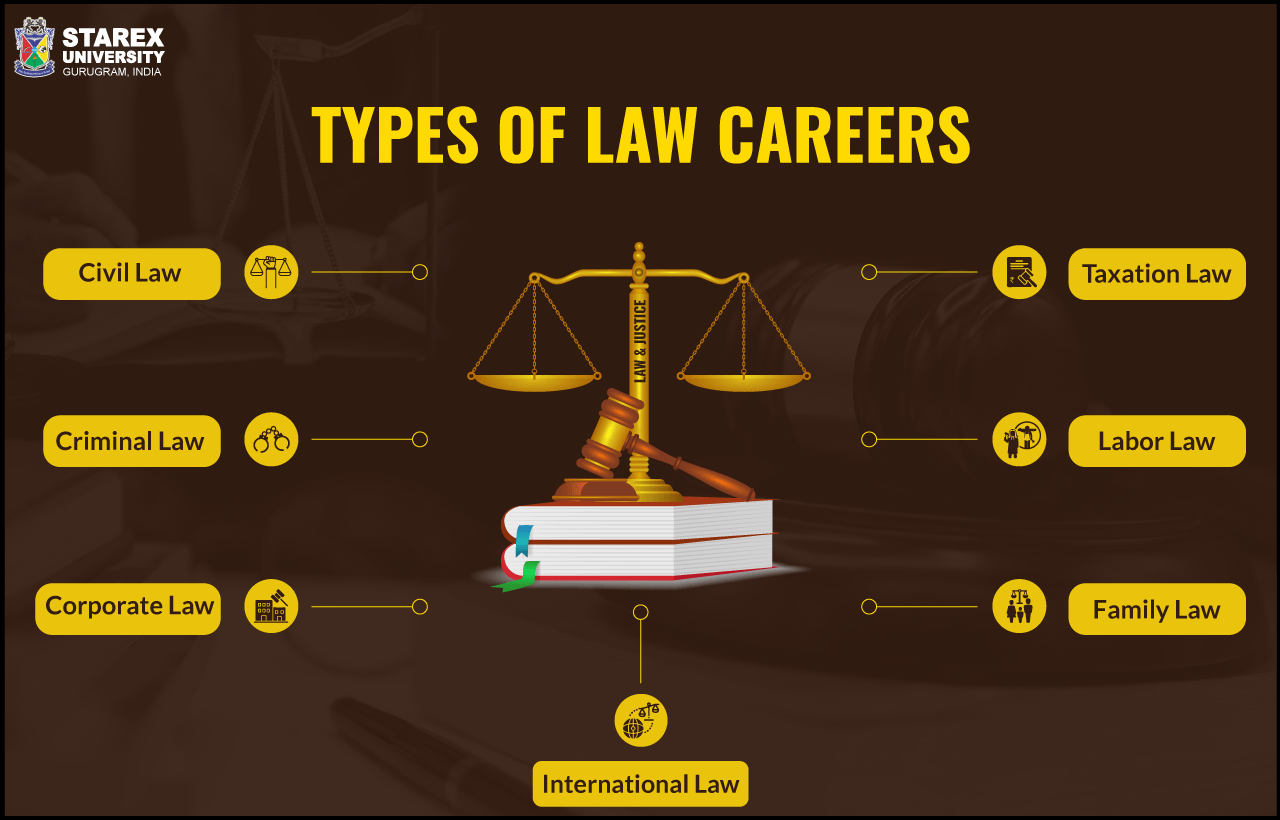
While traditional law firm settings remain prominent, the legal landscape offers diverse career paths beyond the traditional route. Alternative legal careers offer opportunities for lawyers to utilize their skills and knowledge in various settings, contributing to society in different ways.
In-House Counsel
In-house counsel positions provide lawyers with the opportunity to work directly for a company or organization, providing legal advice and support on a wide range of matters. In-house counsel are often involved in contract negotiations, regulatory compliance, intellectual property management, and litigation.
- Advantages: In-house counsel roles offer a stable work environment, competitive salaries, and the opportunity to develop expertise in a specific industry. They also allow lawyers to build strong relationships with colleagues and contribute directly to the success of the organization.
- Disadvantages: In-house counsel positions may involve a narrower scope of legal practice compared to law firms. They may also require a higher level of business acumen and understanding of the specific industry in which they work.
- Examples: General Counsel, Senior Legal Counsel, Legal Director, Corporate Counsel, Intellectual Property Counsel, Compliance Counsel.
Government Agencies
Government agencies employ lawyers in various capacities, providing legal services to the public and ensuring the smooth functioning of government operations. Lawyers in government agencies may work on policy development, regulatory enforcement, criminal prosecution, and civil litigation.
- Advantages: Government agencies offer job security, competitive salaries, and the opportunity to serve the public interest. They also provide opportunities for career advancement and specialization in specific areas of law.
- Disadvantages: Government agencies may have bureaucratic structures and processes, which can sometimes be slow and inefficient. The work can also be demanding and involve long hours, particularly during high-profile cases or legislative sessions.
- Examples: Public Defender, Assistant District Attorney, Environmental Lawyer, Regulatory Attorney, Legislative Counsel.
Non-Profit Organizations
Non-profit organizations employ lawyers to provide legal support and advocacy on a variety of social issues. These lawyers may work on human rights, environmental protection, public interest litigation, and community development.
- Advantages: Non-profit organizations offer a fulfilling work environment, the opportunity to make a real difference in the world, and the chance to work with passionate individuals who share similar values. They may also provide opportunities for pro bono work and legal aid.
- Disadvantages: Non-profit organizations often have limited budgets and may offer lower salaries compared to law firms or government agencies. They may also have a heavy workload and require lawyers to wear multiple hats.
- Examples: Legal Aid Attorney, Policy Advocate, Human Rights Lawyer, Environmental Attorney, Community Development Lawyer.
Legal Technology Companies
Legal technology companies, also known as “legaltech” companies, are increasingly hiring lawyers to develop and implement innovative legal solutions. These companies may focus on areas such as e-discovery, contract management, legal research, and online dispute resolution.
- Advantages: Legal technology companies offer a dynamic and fast-paced work environment, the opportunity to be at the forefront of legal innovation, and the chance to work with cutting-edge technology. They may also offer competitive salaries and benefits.
- Disadvantages: Legal technology companies may be more focused on technology than traditional legal practice, which may not be appealing to all lawyers. The work can also be demanding and require a high level of technical proficiency.
- Examples: Legal Tech Developer, Legal Research Analyst, Contract Management Specialist, E-Discovery Specialist, Online Dispute Resolution Mediator.
Legal Education and Skills
A successful legal career requires a strong foundation in legal education and a set of essential skills. Understanding the different educational pathways and developing the necessary competencies is crucial for aspiring lawyers.
Types of Legal Education
The most common path to becoming a lawyer is through a Juris Doctor (JD) degree. However, there are other educational options available, each offering unique benefits and specializations.
- Juris Doctor (JD) Degree: This is the traditional path to becoming a lawyer in the United States. A JD program typically involves three years of coursework and culminates in a law degree. JD programs cover a wide range of legal subjects, including contracts, torts, property, criminal law, and civil procedure. Upon graduation, students are eligible to take the bar exam, which is required to practice law in a particular jurisdiction.
- Master of Laws (LLM) Degree: An LLM degree is a postgraduate law degree that allows lawyers to specialize in a particular area of law. LLM programs are offered in a variety of legal fields, such as tax law, international law, environmental law, and intellectual property law. An LLM degree can enhance a lawyer’s expertise in a specific area and make them more competitive in the job market.
- Specialized Certifications: In addition to JD and LLM degrees, lawyers can pursue specialized certifications to demonstrate expertise in specific areas of law. These certifications may be offered by professional organizations, bar associations, or other institutions. Examples include Certified Public Accountant (CPA) for tax law, Certified Financial Planner (CFP) for financial law, and Certified Information Privacy Professional (CIPP) for data privacy law.
Essential Skills for Lawyers
A successful legal career requires a combination of hard and soft skills. While legal knowledge is essential, the ability to effectively apply that knowledge and communicate with clients and colleagues is equally important.
- Critical Thinking: Lawyers must be able to analyze complex legal issues, identify key facts, and develop logical arguments. They need to think critically and objectively to evaluate evidence, draw conclusions, and make sound judgments.
- Analytical Skills: Legal practice involves a lot of reading, research, and analysis. Lawyers must be able to read and understand complex legal documents, identify relevant legal principles, and apply them to specific situations. They need to be able to break down complex information into manageable pieces and draw meaningful conclusions.
- Communication Skills: Lawyers must be able to communicate effectively both orally and in writing. They need to be able to explain complex legal concepts in a clear and concise manner to clients, judges, and other legal professionals. Strong writing skills are essential for drafting legal documents, such as contracts, briefs, and motions.
- Research Abilities: Legal research is a fundamental aspect of legal practice. Lawyers must be able to conduct thorough research using legal databases, case law, and other resources to gather relevant information and support their arguments. They need to be able to evaluate the reliability and relevance of information and synthesize it into a coherent narrative.
- Negotiation and Advocacy Skills: Lawyers often act as negotiators and advocates for their clients. They need to be able to effectively negotiate with opposing parties, present arguments persuasively, and advocate for their client’s interests. Strong interpersonal skills and the ability to build rapport with others are essential for success in these areas.
Continuing Legal Education and Professional Development
The legal profession is constantly evolving, so it is essential for lawyers to stay current with the latest legal developments and trends. Continuing legal education (CLE) and professional development are crucial for maintaining competency and staying competitive.
- CLE Requirements: Most jurisdictions require lawyers to complete a certain number of CLE hours each year to maintain their licenses. CLE courses cover a wide range of topics, including new laws, court decisions, and ethical considerations.
- Professional Development Opportunities: Lawyers can also participate in professional development activities, such as attending conferences, joining professional organizations, and mentoring other lawyers. These activities provide opportunities for networking, learning from experts, and staying up-to-date on industry trends.
- Benefits of CLE and Professional Development: Continuing legal education and professional development offer numerous benefits, including:
- Maintaining competency and staying current with legal developments.
- Expanding knowledge and skills in specialized areas of law.
- Networking with other legal professionals and building relationships.
- Improving professional skills, such as communication, negotiation, and advocacy.
- Staying competitive in the job market.
Job Market Trends and Outlook
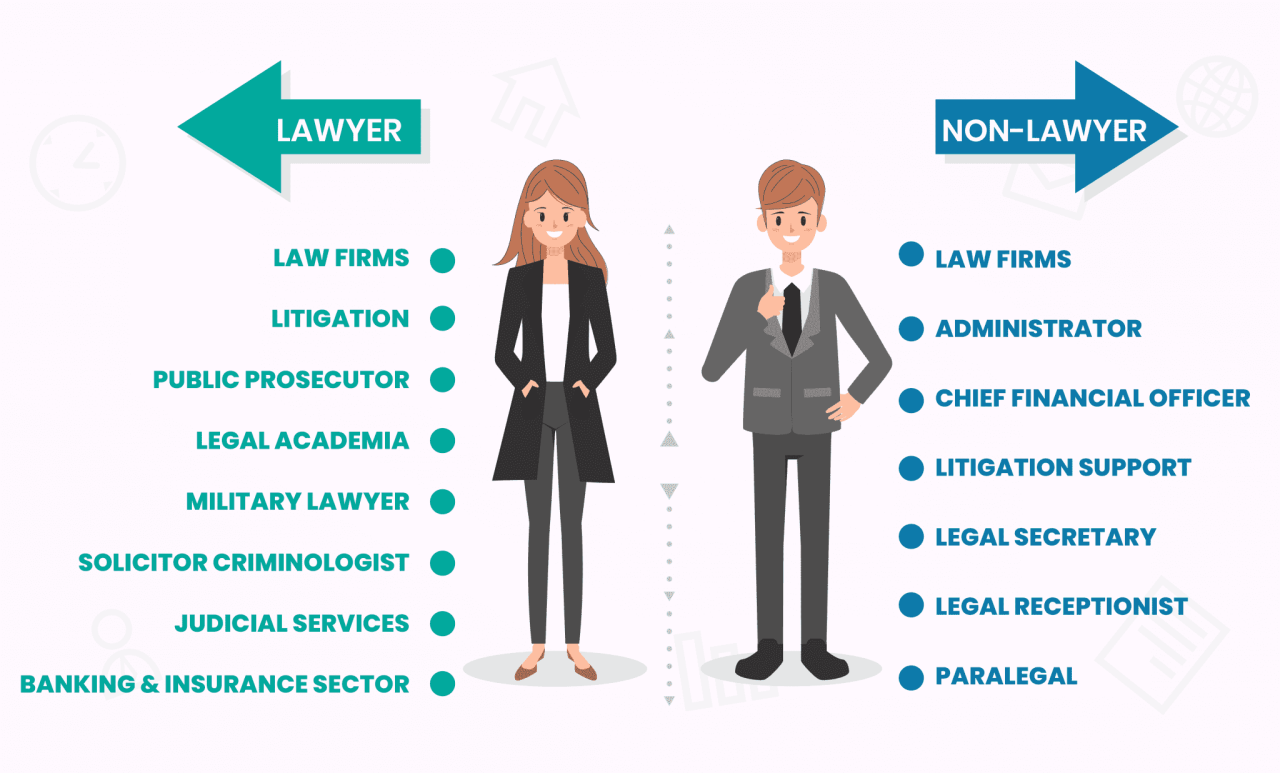
The legal profession is constantly evolving, and understanding current job market trends is crucial for aspiring lawyers. Factors like demand for specific specialties, geographic locations, and the impact of technology are shaping the landscape of legal careers.
Demand for Specific Legal Specialties
The demand for legal professionals varies significantly across different areas of law. Some specialties are experiencing a surge in demand due to changing societal and economic conditions.
- Cybersecurity Law: The increasing reliance on technology and the growing threat of cyberattacks have created a high demand for cybersecurity lawyers. These professionals advise clients on data privacy, cybersecurity breaches, and compliance with relevant regulations.
- Environmental Law: Environmental concerns and regulations are becoming increasingly important, leading to a rise in demand for environmental lawyers. They advise clients on environmental compliance, sustainability, and related litigation.
- Healthcare Law: The complexity of the healthcare industry and the evolving regulatory landscape have created a strong demand for healthcare lawyers. They assist clients with legal issues related to insurance, medical malpractice, and regulatory compliance.
- Intellectual Property Law: The rapid growth of technology and innovation has led to an increased demand for intellectual property lawyers. They protect and enforce clients’ intellectual property rights, including patents, trademarks, and copyrights.
Impact of Technology and Automation on the Legal Profession
Technology is rapidly transforming the legal profession, automating routine tasks and creating new opportunities for lawyers.
- Legal Research and Document Review: Artificial intelligence (AI) and machine learning are automating legal research and document review tasks, enabling lawyers to analyze large volumes of data efficiently. For example, legal tech platforms like ROSS Intelligence and Kira Systems use AI to assist lawyers in research and document analysis.
- Contract Management: Software solutions are automating contract drafting, review, and management, reducing the time and effort required for these tasks. Platforms like DocuSign and ContractWorks streamline the contract lifecycle, enabling lawyers to focus on more complex legal issues.
- E-Discovery and Litigation Support: Technology is transforming the process of e-discovery and litigation support, enabling lawyers to manage and analyze vast amounts of electronic data more efficiently. Tools like Relativity and Nuix are used for e-discovery and litigation support, providing lawyers with advanced analytics and visualization capabilities.
Predictions for the Future of the Legal Profession
The legal profession is expected to continue evolving, with technology playing an increasingly important role.
- Increased Demand for Legal Tech Expertise: Lawyers with expertise in legal technology will be highly sought after. They will be able to leverage technology to improve efficiency, enhance client service, and provide innovative legal solutions.
- Focus on High-Level Legal Skills: While technology automates routine tasks, lawyers will need to focus on developing higher-level skills, such as strategic thinking, negotiation, and client communication. These skills are essential for providing effective legal advice and representation.
- Emergence of New Legal Roles: The integration of technology is likely to create new legal roles focused on data analysis, legal technology implementation, and cybersecurity. These roles will require a combination of legal knowledge and technical skills.
Building a Successful Legal Career
Building a fulfilling and successful legal career requires a strategic approach, encompassing meticulous planning, continuous learning, and effective networking. While legal education provides the foundation, a successful legal career goes beyond academic achievements and involves navigating the complexities of the legal profession, understanding the dynamics of the legal market, and developing essential skills.
Strategies for a Successful Legal Career
| Career Stage | Key Activities | Essential Skills | Networking Strategies |
|---|---|---|---|
| Law School |
|
|
|
| Early Career (0-5 Years) |
|
|
|
| Mid-Career (5-15 Years) |
|
|
|
| Senior Lawyer (15+ Years) |
|
|
|
Career Advancement Strategies
After graduating law school and securing your first legal job, it’s natural to think about how you can advance your career and reach your full potential. There are many paths lawyers can take, each offering unique opportunities for growth and success. This section will explore common career paths, including partnerships, leadership roles, and specialized practice areas, and provide insights into building a successful legal career.
Common Career Paths
Lawyers have several traditional paths for career advancement. These paths often involve gaining experience, building expertise, and demonstrating leadership qualities.
- Partnerships: In law firms, partnership is a prestigious and lucrative goal. Partnerships are typically awarded to lawyers who have demonstrated exceptional legal skills, business acumen, and client relationships. The process for becoming a partner can vary depending on the firm’s structure and size. However, it often involves a period of mentorship, performance evaluations, and a formal vote by existing partners.
- Leadership Roles: Lawyers can also advance their careers by taking on leadership roles within their firms or organizations. These roles might include managing teams, leading projects, or serving on committees. Leadership experience helps lawyers develop their communication, problem-solving, and decision-making skills, which are valuable for career advancement.
- Specialized Practice Areas: Focusing on a specific area of law can enhance a lawyer’s expertise and marketability. Specialization allows lawyers to become recognized experts in their chosen field, attracting clients who need their specific knowledge and experience. Examples of specialized practice areas include intellectual property, tax law, environmental law, and healthcare law.
Building a Strong Professional Network
Networking is crucial for career advancement in the legal field. A strong network can open doors to new opportunities, provide valuable insights, and offer support throughout your career.
- Attend Industry Events: Conferences, seminars, and networking events provide opportunities to connect with other lawyers, legal professionals, and potential clients. Actively engage in conversations, share your expertise, and exchange business cards.
- Join Professional Organizations: Membership in professional organizations, such as bar associations and legal societies, offers networking opportunities, access to resources, and opportunities for leadership roles. Actively participate in committees, events, and mentorship programs.
- Stay Connected with Former Colleagues and Professors: Maintain relationships with former colleagues, classmates, and professors. They can provide valuable advice, referrals, and support throughout your career.
- Develop a Strong Online Presence: Having a professional online presence on LinkedIn and other social media platforms can help you connect with potential clients and employers. Share your expertise, engage in relevant discussions, and highlight your accomplishments.
Building a Reputation in the Legal Field
Building a strong reputation is essential for career advancement. Your reputation is based on your professionalism, expertise, and contributions to the legal field.
- Deliver Excellent Client Service: Always strive to provide exceptional client service, ensuring their needs are met and expectations are exceeded. Clients will remember positive experiences and recommend your services to others.
- Develop a Strong Work Ethic: Demonstrate a strong work ethic by being reliable, punctual, and committed to delivering high-quality work. Your reputation will be enhanced by your consistent effort and dedication.
- Seek Opportunities for Growth: Continuously seek opportunities to enhance your skills and knowledge through continuing legal education courses, seminars, and workshops. Staying up-to-date on legal developments and industry trends demonstrates your commitment to professional growth.
- Give Back to the Community: Volunteering your time and expertise to pro bono legal services or community organizations demonstrates your commitment to the legal profession and society. This can enhance your reputation and create valuable connections.
Last Word
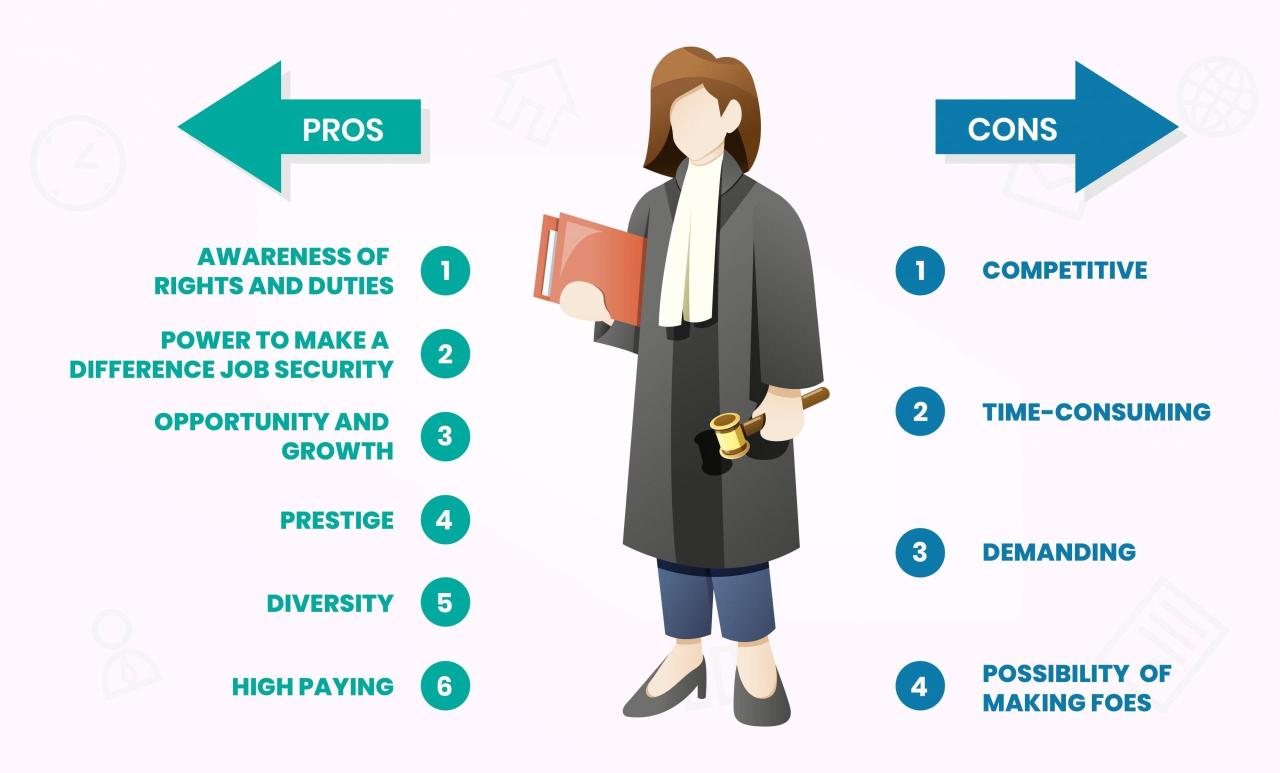
As the legal landscape continues to evolve, the opportunities for lawyers remain abundant and diverse. Whether you seek a traditional legal career, an alternative path, or a combination of both, the key to success lies in developing a strong foundation of legal knowledge, essential skills, and a strategic approach to career advancement. By understanding the trends, challenges, and opportunities within the legal profession, you can navigate this dynamic field and build a fulfilling and rewarding career.
